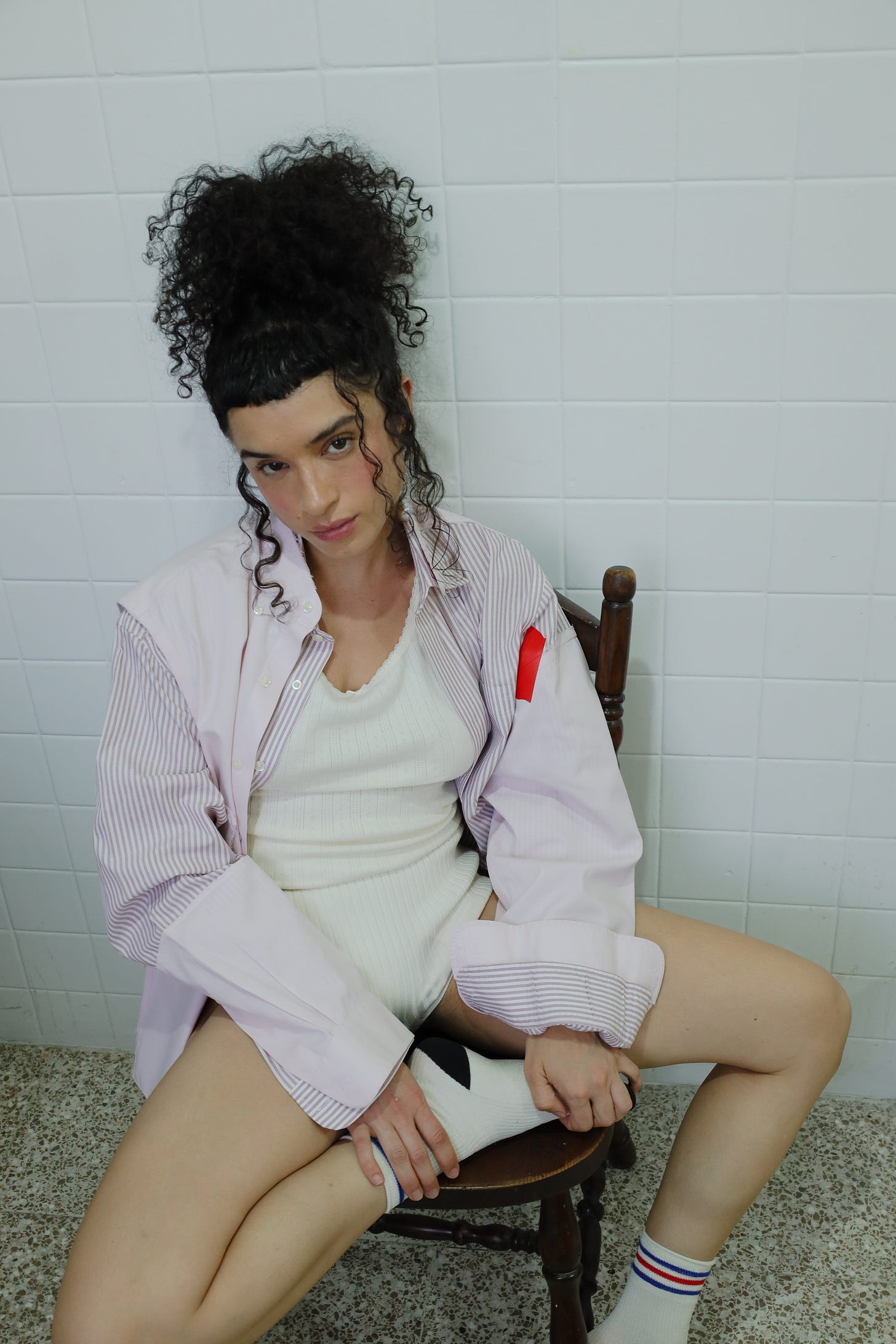Holding the Invisible: Alaíde and the Art of Making the Soul Audible
We talked with Alaíde about music, art, and fashion. A special project in collaboration with Meow Magazine.
Text: Emiliano Villalba
Photos: Denisse Hurle para Meow Magazine
Styling: Olivia Meza de la Orta
MUAH: Jessica Díaz
Production: Meow Magazine x Semanario de Moda
Some artists make music. Alaíde makes worlds. She belongs to that rare lineage of artists who don’t just compose to be heard—they compose to hold what trembles. Her work goes beyond discography: it's an emotional landscape where music, language, and aesthetics melt into a single way of thinking. She sings, yes—but she also observes, writes, imagines, remembers. Alaíde creates with her entire body, even in silence.
“I’ve learned about myself through this new album,” she tells me during our chat at El Minutito. She’s wearing a white dress and flowers in her hair. “I feel focused,” she says as we order mocktails and let the music wash over us. Her creative process feels like a mix of intimate and collective psychoanalysis. It's not about narrating a story, but about discovering herself inside of one. There’s no map for that kind of journey—only intuition. “The creation itself revealed the concept of the album,” she explains. Her new record—set to release soon—wasn’t born from a big idea. It emerged by letting the work speak for itself.
And that deep listening, almost ritualistic, shapes everything she does. Alaíde doesn’t impose direction; she lets the songs reveal themselves like visions. “Music passes through many hands before it reaches the fans,” she says, aware that her practice is collective, yet deeply personal. What she shares is born out of a process as chaotic as it is sacred: composing to find herself.
Back to the root
You can’t read her music without reading her roots. Alaíde grew up in the mountains, surrounded by books, music, and dance. Tepoztlán shaped her among poets, intellectuals, exiles. “Justice, truth, and art were always present in my house—not as lessons, but as atmosphere.” Her grandmother, Alaíde Foppa—poet and feminist, disappeared by the Guatemalan military—still echoes in every verse. A lineage of women who don’t negotiate their freedom.
She’s known her body belonged to her since she was little. “I’ve been choosing my own clothes since I was two,” she recalls. That simple act speaks volumes. For Alaíde, fashion isn’t about styling—it’s about conviction. Each outfit is a statement, a way of designing the body as an archive of values. Not an aesthetic strategy, but a nearly philosophical decision.
It makes sense her sound isn’t confined to a single genre—she weaves cumbia, soul, reggae, jazz, rap—not as collage, but as conversation between roots. “Writing in Spanish isn’t optional for me,” she says firmly. It’s not about identity—it’s about truth. Because it’s in Spanish where wounds and hopes take shape. Because those are the words that name her.
But Alaíde isn’t nostalgia. She’s transformation. Her albums—years in the making—are also acts of maturity. From romantic love to luminous disillusionment. From the need to be loved to the decision not to betray herself. “I realized loving someone else wasn’t going to save me,” she shares. “I had to do the inner work, find a deeper kind of self-respect.” That realization birthed Agüita Clara, an EP that dismantles the myth of love as redemption. A work bold enough to say: not all tenderness is worthy.
In an industry obsessed with obedience and marketing, Alaíde stands firm with fierce softness. “Every time you’re about to betray yourself—don’t,” she says. “Sure, that’s closed doors. But it’s never worth the betrayal.” Her career is a bet on integrity. On following her compass even when others doubt it. “I’ve learned to defend my ideas,” she repeats, not as a motto, but as a form of self-knowledge.
Against the chaos of algorithms, she responds with slowness, care, and process. “Art takes patience,” she says. “I’m not a production robot or perfection machine.” She’s not here to make content. She’s here to hold experience. To let songs breathe before releasing them into the world.
“Intuition becomes clearer when you listen to it,” she says like quoting ancient wisdom. Everything about her centers on that truth: art as an act of faith in the invisible. In the unnamed. In what quivers within—and insists on being.
Alaíde doesn’t sing to decorate the present. She sings to ask what kind of world we’re building, what wounds we’re still carrying, and what tenderness might still be possible. “Building community is how I rebel against competition,” she says. And maybe that’s her boldest move: treating art not as a platform, but as something deeply personal and collective at once.
To listen to her is to be pierced—not by trend, but by vision. Not by rhythm, but by ethics. Alaíde doesn’t make songs. She builds spaces for reflection. For joy, yes—but also for healing. Her work resists the ordinary without losing the beauty inside it.
And that, in these noisy times, is a form of revolution.












